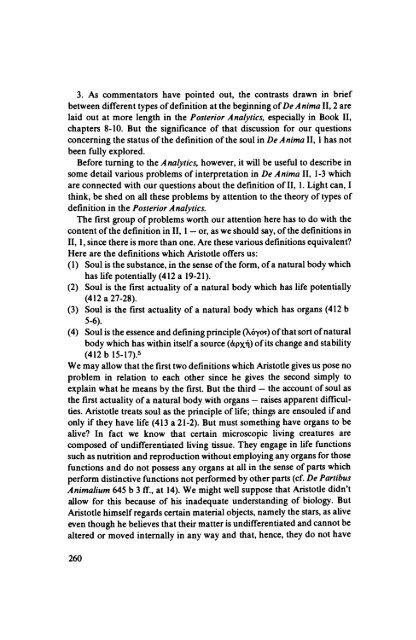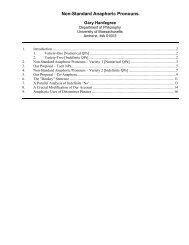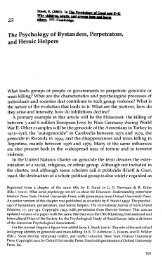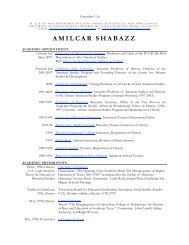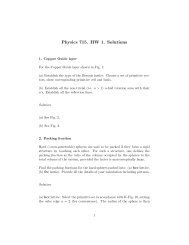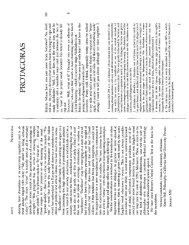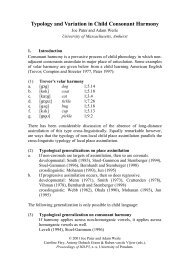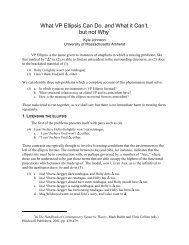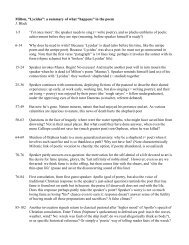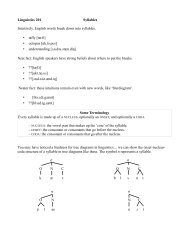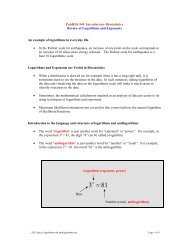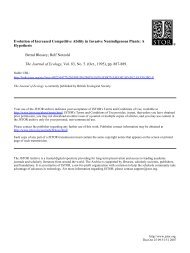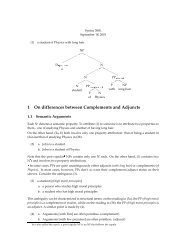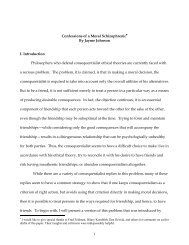Aristotle's Definitions of the Soul: "De Anima" ii, 1-3
Aristotle's Definitions of the Soul: "De Anima" ii, 1-3
Aristotle's Definitions of the Soul: "De Anima" ii, 1-3
Create successful ePaper yourself
Turn your PDF publications into a flip-book with our unique Google optimized e-Paper software.
3. As commentators have pointed out, <strong>the</strong> contrasts drawn in brief<br />
between different types <strong>of</strong> definition at <strong>the</strong> beginning <strong>of</strong> <strong>De</strong>eAnima 11, 2 are<br />
laid out at more length in <strong>the</strong> Posterior Analytics, especially in Book II,<br />
chapters 8-10. But <strong>the</strong> significance <strong>of</strong> that discussion for our questions<br />
concerning <strong>the</strong> status <strong>of</strong> <strong>the</strong> definition <strong>of</strong> <strong>the</strong> soul in <strong>De</strong> A nima II, I has not<br />
been fully explored.<br />
Before turning to <strong>the</strong> Analytics, however, it will be useful to describe in<br />
some detail various problems <strong>of</strong> interpretation in <strong>De</strong> A nima II, 1-3 which<br />
are connected with our questions about <strong>the</strong> definition <strong>of</strong> II, 1. Light can, I<br />
think, be shed on all <strong>the</strong>se problems by attention to <strong>the</strong> <strong>the</strong>ory <strong>of</strong> types <strong>of</strong><br />
definition in <strong>the</strong> Posterior Analytics.<br />
The first group <strong>of</strong> problems worth our attention here has to do with <strong>the</strong><br />
content <strong>of</strong> <strong>the</strong> definition in II, 1 - or, as we should say, <strong>of</strong> <strong>the</strong> definitions in<br />
II, 1, since <strong>the</strong>re is more than one. Are <strong>the</strong>se various definitions equivalent?<br />
Here are <strong>the</strong> definitions which Aristotle <strong>of</strong>fers us:<br />
(1) <strong>Soul</strong> is <strong>the</strong> substance, in <strong>the</strong> sense <strong>of</strong> <strong>the</strong> form, <strong>of</strong> a natural body which<br />
has life potentially (412 a 19-21).<br />
(2) <strong>Soul</strong> is <strong>the</strong> first actuality <strong>of</strong> a natural body which has life potentially<br />
(412 a 27-28).<br />
(3) <strong>Soul</strong> is <strong>the</strong> first actuality <strong>of</strong> a natural body which has organs (412 b<br />
5-6).<br />
(4) <strong>Soul</strong> is <strong>the</strong> essence and defining principle (Xoyos) <strong>of</strong> that sort <strong>of</strong> natural<br />
body which has within itself a source (&px~) <strong>of</strong> its change and stability<br />
(412 b 15-17).5<br />
We may allow that <strong>the</strong> first two definitions which Aristotle gives us pose no<br />
problem in relation to each o<strong>the</strong>r since he gives <strong>the</strong> second simply to<br />
explain what he means by <strong>the</strong> first. But <strong>the</strong> third - <strong>the</strong> account <strong>of</strong> soul as<br />
<strong>the</strong> first actuality <strong>of</strong> a natural body with organs - raises apparent difficulties.<br />
Aristotle treats soul as <strong>the</strong> principle <strong>of</strong> life; things are ensouled if and<br />
only if <strong>the</strong>y have life (413 a 21-2). But must something have organs to be<br />
alive? In fact we know that certain microscopic living creatures are<br />
composed <strong>of</strong> undifferentiated living tissue. They engage in life functions<br />
such as nutrition and reproduction without employing any organs for those<br />
functions and do not possess any organs at all in <strong>the</strong> sense <strong>of</strong> parts which<br />
perform distinctive functions not performed by o<strong>the</strong>r parts (cf. <strong>De</strong> Partibus<br />
Animalium 645 b 3 ff., at 14). We might well suppose that Aristotle didn't<br />
allow for this because <strong>of</strong> his inadequate understanding <strong>of</strong> biology. But<br />
Aristotle himself regards certain material objects, namely <strong>the</strong> stars, as alive<br />
even though he believes that <strong>the</strong>ir matter is undifferentiated and cannot be<br />
altered or moved internally in any way and that, hence, <strong>the</strong>y do not have<br />
260


